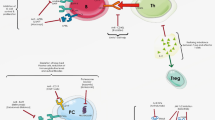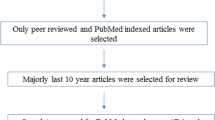Abstract
The availability of biologic agents targeting tumor necrosis factor (TNF)-α represents a significant advance in the management of rheumatoid arthritis. Anti-TNF-α therapy has been associated with dramatic improvements in the clinical signs and symptoms of rheumatoid arthritis and has been shown to greatly retard the destructive process that too often characterizes this condition. Although effective and well-tolerated in a substantial proportion of patients, primary and secondary failures of anti-TNF-α strategies have been well described, affecting up to one-third to one-half of subjects treated with these agents. Switching from one anti-TNF-α agent to a second (or even third) anti-TNF-α therapy has emerged as a means of addressing treatment failures with this drug class. This review examines data addressing the practice of switching anti-TNF-α agents in the context of initial treatment failure, with a focus on data from peer-reviewed reports.
Similar content being viewed by others
References and Recommended Reading
Furst D, Wallis R, Broder M, Beenhouwer D: Tumor necrosis factor antagonists: different kinetics and/or mechanisms of action may explain differences in the risk for developing granulomatous infection. Semin Arthritis Rheum 2006, 36:159–167.
Amgen and Wyeth: Enbrel [prescribing information]. Available at http://www.enbrel.com/prescribing-information.jsp. Accessed August 3, 2007.
Centocor: Remicade [prescribing information]. Available at http://www.remicade.com/remicade/assets/HCP_PPI.pdf. Accessed August 3, 2007.
Knight D, Trinh H, Le J, et al.: Construction and initial characterization of a mouse-human chimeric anti-TNF antibody. Mol Immunol 1993, 30:1443–1453.
Scallon B, Moore M, Trinh H, et al.: Chimeric anti-TNF-alpha monoclonal antibody cA2 binds recombinant transmembrane TNF-alpha and activates immune effector functions. Cytokine 1995, 7:251–259.
Sandborn W: Optimizing anti-tumor necrosis factor strategies in inflammatory bowel disease. Curr Gastroenterol Rep 2003, 5:501–505.
Maini R, Breedveld F, Kalden J, et al.: Therapeutic efficacy of multiple intravenous infusions of anti tumor necrosis factor alpha monoclonal antibody combined with low-dose weekly methotrexate in rheumatoid arthritis. Arthritis Rheum 1998, 41:1552–1563.
Abbott: Humira [prescribing information]. Available at http://www.rxabbott.com/pdf/humira.pdf. Accessed August 3, 2007.
Breedveld F, Weisman M, Kavanaugh A, et al.: The PREMIER study: a multicenter, randomized, double-blind clinical trial of combination therapy with adalimumab plus methotrexate versus methotrexate alone or adalimumab alone in patients with early, aggressive rheumatoid arthritis who had not had previous methotrexate treatment. Arthritis Rheum 2006, 54:26–37.
van der Heijde D, Klareskog L, Rodriguez-Valverde V, et al.: Comparison of etanercept and methotrexate, alone and combined, in the treatment of rheumatoid arthritis: two-year clinical and radiographic results from the TEMPO study, a double-blind, randomized trial. Arthritis Rheum 2006, 54:1063–1074.
Buch M, Bingham S, Bryer D, Emery P: Long-term infliximab treatment in rheumatoid arthritis: subsequent outcome of initial responders. Rheumatology (Oxford) 2007, 46:1153–1156.
Keystone E: Switching tumor necrosis factor inhibitors: an opinion. Nat Clin Pract Rheumatol 2006, 2:576–577.
Gomez-Reino JJ, Carmona L, BIOBADASER Group: Switching TNF antagonists in patients with chronic arthritis: an observational study of 488 patients over a four-year period. Arthritis Res Ther 2006, 8:R29.
van Vollenhoven R, Harju A, Brannemark S, Klareskog L: Treatment with infliximab (Remicade) when etanercept (Enbrel) has failed or vice versa: data from the STURE registry showing that switching tumour necrosis factor alpha blockers can make sense. Ann Rheum Dis 2003, 62:1195–1198.
Haraoui B, Keystone E, Thorne J, et al.: Clinical outcomes of patients with rheumatoid arthritis after switching from infliximab to etanercept. J Rheumatol 2004, 31:2356–2359.
Hansen K, Hildebrand J, Genovese M, et al.: The efficacy of switching from etanercept to infliximab in patients with rheumatoid arthritis. J Rheumatol 2004, 31:1098–1102.
Hyrich K, Lunt M, Watson K, et al.: Outcomes after switching from one anti-tumor necrosis factor alpha agent to a second anti-tumor necrosis factor alpha agent in patients with rheumatoid arthritis. Arthritis Rheum 2007, 56:13–20.
Iannone F, Trotta F, Monteccuco C, et al.: Etanercept maintains the clinical benefit achieved by infliximab in patients with rheumatoid arthritis who discontinued infliximab because of side effects. Ann Rheum Dis 2007, 66:249–252.
Di Poi E, Perin A, Morassi M, et al.: Switching to etanercept in patients with rheumatoid arthritis with no response to infliximab. Clin Exp Rheumatol 2007, 25:85–87.
Buch M, Bingham S, Bejarano V, et al.: Therapy of patients with rheumatoid arthritis: outcome of infliximab failures switched to etanercept. Arthritis Rheum 2007, 57:448–453.
Solau-Gervais E, Laxenaire N, Cortet B, et al.: Lake of efficacy of a third tumour necrosis factor alpha antagonist after failure of a soluble receptor and a monoclonal antibody. Rheumatology (Oxford) 2006, 45:1121–1124.
Nikas S, Voulgari P, Alamanos Y, et al.: Efficacy and safety of switching from infliximab to adalimumab: a comparative study. Ann Rheum Dis 2006, 65:257–260.
Bennett A, Peterson P, Zain A, et al.: Adalimumab in clinical practice. Outcome in 70 rheumatoid arthritis patients, including comparison of patients with and without previous anti-TNF exposure. Rheumatology (Oxford) 2005, 44:1026–1031.
Wick M, Ernestam S, Lindblad S, et al.: Adalimumab (Humira) restores clinical response in patients with secondary loss of efficacy to infliximab (Remicade) or etanercept (Enbrel): results from the STURE registry at Karolinska University Hospital. Scand J Rheumatol 2005, 34:353–358.
Author information
Authors and Affiliations
Corresponding author
Rights and permissions
About this article
Cite this article
Erickson, A.R., Mikuls, T.R. Switching anti-TNF-α agents: What is the evidence?. Curr Rheumatol Rep 9, 416–420 (2007). https://doi.org/10.1007/s11926-007-0066-2
Published:
Issue Date:
DOI: https://doi.org/10.1007/s11926-007-0066-2




